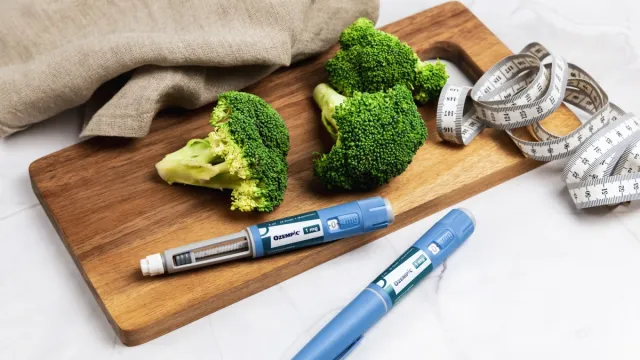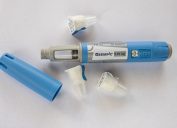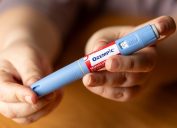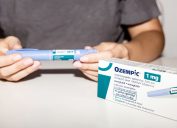Doctor Says These Foods and Supplements Mimic Ozempic Effects
If weight-loss medication isn't an option, you might want to try adding these to your diet.

If you've ever actively tried to lose weight, you know that it can be challenging, to say the least. Thankfully, weight-loss drugs are now an option for those who haven't had success with traditional methods. One popular option is semaglutide, which is better known by the brand names Ozempic and Wegovy. (The latter is actually approved to treat obesity, while Ozempic is only indicated for the treatment of type 2 diabetes and is prescribed off-label for weight loss.) However, these medications aren't an option for everyone because they can be costly, have to be prescribed by a doctor, and can produce some painful side effects.
RELATED: Certain Foods Trigger Natural Ozempic-Like Weight Loss Effect, Doctor Says.
If medication isn't something you're interested in, but you're looking for similar effects, there are some methods you can try. According to Lauren DeDecker, MD, an internal medicine doctor who posts educational content on TikTok (@DrDeDeck), there are foods and supplements that mimic the effects of Ozempic.
"I've had some patients ask me how they can get the effects of Ozempic without having to take it—and there's two main ways. One is through the gut microbiome and the other is through diet," DeDecker says in a Jan. 3 video.
Ozempic works by activating the glucagon-like peptide-1 (GLP-1) receptors in your body, which then "slows the movement of food from your stomach through your intestines," DeDecker explains.
For a similar effect, you can try adding a probiotic with Akkermansia, which is a type of bacteria in your gut.
"There's a certain bacteria called Akkermansia that's been shown to naturally increase GLP-1 levels—and you could get that in certain probiotics," she says, adding that you can also supplement with the probiotic VSL#3, which has been shown to increase GLP-1 too.
RELATED: How Your Eating Habits Change After You Stop Taking Ozempic, New Study Says.
DeDecker has a separate video on Akkermansia muciniphila, outlining findings from a May 2021 study in mice published in Nature Microbiology.
"There is not a lot of research, especially in humans on how to naturally increase GLP1 but the key principals I have found in my review of the literature is fiber and certain gut microbes," the caption of the Dec. 29, 2023, TikTok reads. "Akkermansia has been shown to help regulate metabolism and improve insulin sensitivity in some studies."
DeDecker wrote that it's currently "unclear" whether taking these kinds of probiotics will directly mimic the effects of Ozempic, as the products don't specify how much Akkermansia is in them or if the bacteria are alive.
Because the microbiome is so complex, DeDecker says it's likely "too close-minded" to exclusively supplement with one strain of bacteria. Instead, your safest bet is to introduce certain foods as well.
In the caption of her Jan. 3 video, DeDecker notes that "the most straight forward way" to try and mimic Ozempic is to ensure that you're getting at least eight grams of fiber with every meal. It's even better if you can update this number to 10 or more.
"You might have known this was coming, but eating a diet with a ton of fiber has been shown to increase GLP-1 levels," she says in the TikTok.
RELATED: 4 Foods That Spike the Same Weight Loss Hormone as Ozempic, Experts Say.
Responding to a commenter, DeDecker clarified that plants are the best way to achieve this intake and "feed your gut microbes." She recommends consuming a wide variety of fruits, vegetables, beans, whole grains, and oats every day.
In the caption, she adds that there are different kinds of fiber, so it helps to do a bit of research.
"Read up on the types of fiber—soluble, insoluble, fermentable, and be sure to eat foods so that you are getting all the types!" the caption reads. "Fermentable fiber specifically has been studied and found to increase GLP-1, so you can include sources of fermentable fiber at each meal!"
In her Dec. 2023 video, DeDecker says fermented foods in general are also a good call for your diet, including yogurt, kefir, natto, miso, naturally fermented pickles and vegetables, and kombucha.
RELATED: For more up-to-date information, sign up for our daily newsletter.





















